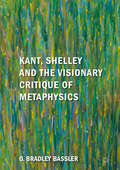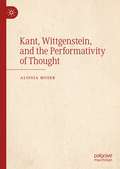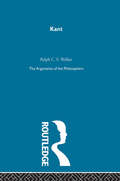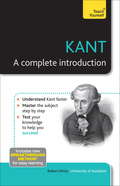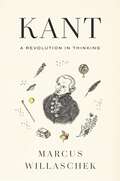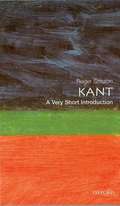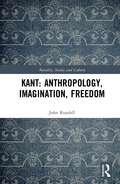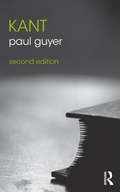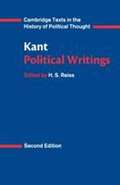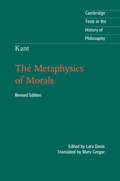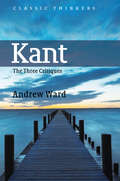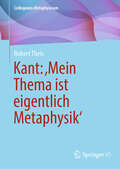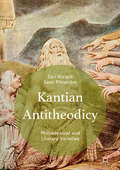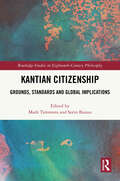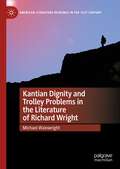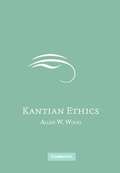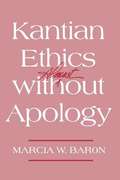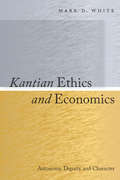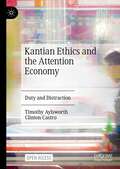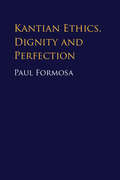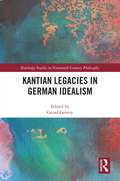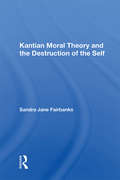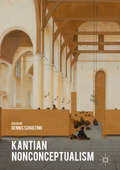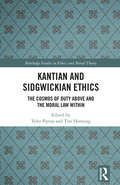- Table View
- List View
Kant, Shelley and the Visionary Critique of Metaphysics
by O. Bradley BasslerThis book addresses the philosophy of Kant and the poetry of Shelley as historical starting points for a new way of thinking in the modern age. Fusing together critical philosophy and visionary poetry, Bassler develops the notion of visionary critique, or paraphysics, as a model for future philosophical endeavor. This philosophical practice is rooted in the concept of the indefinite power associated with the sublime in both Kant and Shelley’s work, to which the notion of the parafinite or indefinitely large is extended in this book.
Kant, Wittgenstein, and the Performativity of Thought
by Aloisia MoserThis book explores the idea that there is a certain performativity of thought connecting Kant’s Critique of Pure Reason and Wittgenstein’s Tractatus Logico-Philosophicus. On this view, we make judgments and use propositions because we presuppose that our thinking is about something, and that our propositions have sense. Kant’s requirement of an a priori connection between intuitions and concepts is akin to Wittgenstein’s idea of the general propositional form as sharing a form with the world. Aloisia Moser argues that Kant speaks about acts of the mind, not about static categories. Furthermore, she elucidates the Tractatus’ logical form as a projection method that turns into a so-called ‘zero method’, whereby propositions are merely the scaffolding of the world. In so doing, Moser connects Kantian reflective judgment to Wittgensteinian rule-following. She thereby presents an account of performativity centering neither on theories nor methods, but on the application enacting them in the first place.
Kant-Arg Philosophers
by Ralph C Walker"First Published in 1999, Routledge is an imprint of Taylor & Francis, an informa company."
Kant: A Biography
by Manfred KuehnThis is the first full-length biography in more than fifty years of Immanuel Kant, one of the giants among the pantheon of Western philosophers, and one of the most powerful and influential in contemporary philosophy. Taking account of the most recent scholarship, Manfred Kuehn allows the reader to follow the same journey that Kant himself took in emerging as a central figure in modern philosophy. Manfred Kuehn was formerly Professor of Philosophy at Purdue University. A specialist on German philosophy of the period, he is the author of numerous articles and papers on Immanuel Kant.
Kant: A Complete Introduction: Teach Yourself
by Robert WicksWritten by Robert Wicks, a recognised Kant specialist who teaches at the University of Auckland, Kant: A Complete Introduction is designed to give you everything you need to succeed, all in one place. It covers the key areas that students are expected to be confident in, outlining the basics in clear jargon-free English, and then providing added-value features like summaries of key books, and even lists of questions you might be asked in your seminar or exam.The book uses a structure that mirrors many university courses on Freud and psychoanalysis - explaining and contextualising Kant's theories, which have been among the most influential in Philosophy. The book starts by introducing Kant and his way of thinking and arguing, before looking at how Kant answered three key questions: What can I know? What should I do? What may I hope? In doing so, Professor Wicks introduces the reader to all of Kant's key work, including The Critique of Pure Reason.Teach Yourself titles employ the 'Breakthrough method', which is designed specifically to overcome problems that students face.- Problem: "I find it difficult to remember what I've read."; Solution: this book includes end-of-chapter questions and summaries, and flashcards of key points available on-line and as apps- Problem: "Most books mention important other sources, but I can never find them in time."; Solution: this book includes key texts and case studies are summarised, complete with fully referenced quotes ready to use in your essay or exam.- Problem: "Lots of introductory books turn out to cover totally different topics than my course."; Solution: this book is written by a current university lecturer who understands what students are expected to know.
Kant: A Revolution in Thinking
by Marcus WillaschekA foremost Kant expert takes us on a lively tour through the revolutionary ideas of the founder of modern philosophy.Immanuel Kant is undoubtedly the most important philosopher of the modern era. His Critique of Pure Reason, “categorical imperative,” and conception of perpetual peace in the global order decisively influenced both intellectual history and twentieth-century politics, shaping everything from the German Constitution to the United Nations Charter.Renowned philosopher Marcus Willaschek explains why, three centuries after Kant’s birth, his reflections on democracy, beauty, nature, morality, and the limits of human knowledge remain so profoundly relevant. Weaving biographical and historical context together with exposition of key ideas, Willaschek emphasizes three central features of Kant’s theory and method. First, Kant combines seemingly incompatible positions to show how their insights can be reconciled. Second, he demonstrates that it is not only human thinking that must adjust to the realities of the world; the world must also be fitted to the structures of our thinking. Finally, he overcomes the traditional opposition between thought and action by putting theory at the service of practice.In Kant: A Revolution in Thinking, even readers having no prior acquaintance with Kant’s ideas or with philosophy generally will find an adroit introduction to the Prussian polymath’s oeuvre, beginning with his political arguments, expanding to his moral theory, and finally moving to his more abstract considerations of natural science, epistemology, and metaphysics. Along the way, Kant himself emerges from beneath his famed works, revealing a magnetic personality, a clever ironist, and a man deeply engaged with his contemporary world.
Kant: A Very Short Introduction
by Roger ScrutonKant is arguably the most influential modern philosopher, but also one of the most difficult. Roger Scruton tackles his exceptionally complex subject with a strong hand, exploring the background to Kant's work and showing why the Critique of Pure Reason has proved so enduring.
Kant: Anthropology Imagination Freedom (Morality, Society and Culture)
by John RundellIn a new reading of Immanuel Kant’s work, this book interrogates his notions of the imagination and anthropology, identifying these – rather than the problem of reason – as the two central pivoting orientations of his work. Such an approach allows a more complex understanding of his critical-philosophical program to emerge, which includes his accounts of reason, politics and freedom as well as subjectivity and intersubjectivity, or sociabilities. Examining Kant’s theorisation of the complexity of our phenomenological existence, the author explores his transcendental move that includes reason and understanding whilst emphasising the importance of the faculty of the imagination to undergird both, before moving to consider Kant’s pluralised, transcendental notion of freedom. This outstanding book will appeal to scholars with interests in philosophy, politics, anthropology and sociology, working on questions of imagination, reason, subjectivities and human freedom.
Kant: Essays On Aesthetics And Morality (The Routledge Philosophers)
by Paul GuyerIn this updated edition of his outstanding introduction to Kant, Paul Guyer uses Kant’s central conception of autonomy as the key to his thought. Beginning with a helpful overview of Kant’s life and times, Guyer introduces Kant’s metaphysics and epistemology, carefully explaining his arguments about the nature of space, time and experience in his most influential but difficult work, The Critique of Pure Reason. He offers an explanation and critique of Kant’s famous theory of transcendental idealism and shows how much of Kant’s philosophy is independent of this controversial doctrine. He then examines Kant’s moral philosophy, his celebrated ‘categorical imperative’ and his theories of duty, freedom of will and political rights. This section of the work has been substantially revised to clarify the relation between Kant’s conceptions of "internal" and "external" freedom. In his treatments of Kant’s aesthetics and teleology, Guyer focuses on their relation to human freedom and happiness. Finally, he considers Kant’s view that the development of human autonomy is the only goal that we can conceive for both natural and human history. Including a chronology, glossary, chapter summaries and up-to-date further reading, Kant, second edition is an ideal introduction to this demanding yet pivotal figure in the history of philosophy, and essential reading for all students of philosophy.
Kant: Political Writings (2nd, Enlarged Edition)
by Immanuel Kant H. B. NisbetThe original edition of Kant: Political Writings was first published in 1970, and has long been established as the principal English-language edition of this important body of writing. In this new, expanded edition two important texts illustrating Kant's view of history are included for the first time, his reviews of Herder's Ideas on the Philosophy of the History of Mankind and Conjectures on the Beginning of Human History, as well as the essay What is Orientation in Thinking'. In addition to a general introduction assessing Kant's political thought in terms of his fundamental principles of politics, this edition also contains such useful student aids as notes on the texts, a comprehensive bibliography and a new postscript, looking at some of the principal issues in Kantian scholarship that have arisen since the first edition.
Kant: The Metaphysics of Morals (Cambridge Texts in the History of Philosophy)
by Immanuel Kant Lara Denis Mary GregorThe Metaphysics of Morals is Kant's final major work in moral philosophy. In it, he presents the basic concepts and principles of right and virtue and the system of duties of human beings as such. The work comprises two parts: the Doctrine of Right concerns outer freedom and the rights of human beings against one another; the Doctrine of Virtue concerns inner freedom and the ethical duties of human beings to themselves and others. Mary Gregor's translation, lightly revised for this edition, is the only complete translation of the entire text, and includes extensive annotation on Kant's difficult and sometimes unfamiliar vocabulary. This edition includes numerous new footnotes, some of which address controversial aspects of Gregor's translation or offer alternatives. Lara Denis's introduction sets the work in context, explains its structure and themes, and introduces important interpretive debates. The volume also provides thorough guidance on further reading including online resources.
Kant: The Three Critiques (Classic Thinkers)
by Andrew WardImmanuel Kants three critiques the Critique of Pure Reason, the Critique of Practical Reason and the Critique of Judgment are among the pinnacles of Western Philosophy. This accessible study grounds Kants philosophical position in the context of his intellectual influences, most notably against the background of the scepticism and empiricism of David Hume. It is an ideal critical introduction to Kants views in the key areas of knowledge and metaphysics; morality and freedom; and beauty and design. By examining the Kantian system in the light of contemporary arguments, Ward brings the structure and force of Kants Copernican Revolution in Philosophy into sharp focus. Kant is often misrepresented as a somewhat dry thinker, yet the clarity of Wards exposition of his main themes, science, morality and aesthetics, through the three critiques brings his writings and theories to life. Lucidly and persuasively written, this book will be a valuable resource for students and scholars seeking to understand Kants immense influence.
Kant: ‚Mein Thema ist eigentlich Metaphysik‘ (Colloquium Metaphysicum)
by Robert Theis„Mein Thema ist eigentlich Metaphysik in der weitesten Bedeutung“ bemerkt Kant im Jahr 1794. Die Probleme der Metaphysik, ihre Methode, ja die Frage nach ihrer Möglichkeit und deren Bedingungen bleiben ein konstantes Thema seiner Veröffentlichungen und Forschungen. Die in diesem Band vereinigten Aufsätze beleuchten unterschiedliche Aspekte dieses Lebensthemas: eine Rekonstruktion zentraler Etappen auf dem Weg hin zu einer sogenannten ‚Ideenmetaphysik‘, so wie sie ihre erste Form in der 1781 erschienenen Kritik der reinen Vernunft gefunden hat; sodann eine Untersuchung zum 'Transzendentalen Ideal' als der höchsten metaphysischen Idee. Weiterhin wird Kants Ideenmetaphysik im Hinblick auf die Sinnfrage gedeutet, und unter dem Stichwort des 'doktrinalen Glaubens' die Frage nach der spezifischen Modalität des metaphysischen Diskurses behandelt. Schließlich münden diese Untersuchungen in die Erörterung der Idee einer praktisch-orientierten Metaphysik als Antwort auf die Fragen nach Gott und zukünftigem Leben – Antworten, die Ausdruck letzter Gedanken sind.
Kantian Antitheodicy
by Sami Pihlström Sari KivistöThis book defends antitheodicism, arguing that theodicies, seeking to excuse God for evil and suffering in the world, fail to ethically acknowledge the victims of suffering. The authors argue for this view using literary and philosophical resources, commencing with Immanuel Kant's 1791 "Theodicy Essay" and its reading of the Book of Job. Three important twentieth century antitheodicist positions are explored, including "Jewish" post-Holocaust ethical antitheodicism, Wittgensteinian antitheodicism exemplified by D. Z. Phillips and pragmatist antitheodicism defended by William James. The authors argue that these approaches to evil and suffering are fundamentally Kantian. Literary works such as Franz Kafka's The Trial, Samuel Beckett's Waiting for Godot, and George Orwell's Nineteen Eighty-Four, are examined in order to crucially advance the philosophical case for antitheodicism.
Kantian Citizenship: Grounds, Standards and Global Implications (Routledge Studies in Eighteenth-Century Philosophy)
by Mark Timmons Sorin BaiasuThis book is a collection of 12 new essays on the topic of Kant’s account of citizenship, the first book-length text on this topic. It features an international cast of leading scholars who specialize in Kant’s ethics, philosophy of religion and political philosophy. The contributors connect Kant’s philosophy with contemporary issues concerning citizenship, including the moral grounds of citizenship rights, the relation between citizenship, human rights and dignity, civic virtues, citizenship in the ethical commonwealth, in particular the moral function of religious rituals, the link between ethical duties and faith, and the relation between religious freedom and political power, democratic participation, the legitimacy of international courts, just war theory, cosmopolitanism and the contemporary relevance of a Kantian account of citizenship.The topic is of interest given some of the currently urgent citizenship-related challenges that we are facing today. Kant’s account of justice stipulates that, in a fair and peaceful world, the legal framework that establishes rights and obligations should be effective at national, international and cosmopolitan levels. Kant’s legal and political philosophy also features the unique combination of a realistic appraisal of the human condition and powerful normative recommendations concerning action and principles of ethics and law. Together with Kant’s emphasis on the requirement of consistency, the approaches discussed in the volume are better able to orient thinking and guide action for currently urgent ethical, legal, political and social problems.Kantian Citizenship will appeal to scholars and graduate students working on Kant’s legal and political philosophy, as well as scholars from other fields who are interested in legal philosophy and the politics of citizenship.
Kantian Dignity and Trolley Problems in the Literature of Richard Wright (American Literature Readings in the 21st Century)
by Michael WainwrightThis book examines the literature of African-American author Richard Wright and the philosophy of Immanuel Kant, arguing that Wright was not only the foremost proponent of minoritarian protest literature, but also a groundbreaking minoritarian exponent of philosophical literature. In presenting this argument, the volume defends trolley problems from the criticism that some philosophers level against them by promoting their use as an interpretive tool for literary scholars. Starting with Martha C. Nussbaum’s interventions in literary theory concerning Henry James and perceptive equilibrium, this book draws on the philosophical thoughts of her contemporaries—Philippa Foot, John Rawls, Judith Jarvis Thomson, and Derek Parfit—to analyze Uncle Tom’s Children, especially “Down by the Riverside,” alongside other works by Wright. This approach emphasizes Wright’s recognition of the importance and integrity of Kant’s concept of dignity.
Kantian Ethics
by Allen W. WoodIn this book, Allen W. Wood investigates Kant's conception of ethical theory, using it to develop a viable approach to the rights and moral duties of human beings.
Kantian Ethics Almost Without Apology
by Marcia W. BaronA defence of Kant's deontological conception of ethics. The author offers reflections on two supposed problems with Kant's ethics: that it leaves no room for supererogatory actions and that it overemphasizes the value of acting from duty.
Kantian Ethics and Economics
by Mark D. WhiteThis book introduces the moral philosophy of Immanuel Kant-in particular, the concepts of autonomy, dignity, and character-to economic theory, explaining the importance of integrating these two streams of intellectual thought. Mainstream economics is rooted in classical utilitarianism, recommending that decision makers choose the options that are expected to generate the largest net benefits. For individuals, the standard economic model fails to incorporate the role of principles in decision-making, and also denies the possibility of true choice, which can be independent of preferences and principles altogether. For policymakers, standard decision-making frameworks recommend tradeoffs that are beneficial in terms of material goods or wealth, but may be morally questionable from a more person-centered perspective. Integrating Kantian ethics affects economics in three important ways. This integration allows for a more complete understanding of human choice, incorporating not just preferences and constraints, but also principles and strength of will or character. It demonstrates the broader impact of welfare economics, which generates policies that affect not only persons' well-being, but also their dignity and autonomy. Finally, it reconciles the traditional, individualist stance in economic models of choice with the social responsibility emphasized by many systems of philosophical ethics and heterodox schools of economics.
Kantian Ethics and the Attention Economy: Duty and Distraction
by Clinton Castro Timothy AylsworthIn this open access book, Timothy Aylsworth and Clinton Castro draw on the deep well of Kantian ethics to argue that we have moral duties, both to ourselves and to others, to protect our autonomy from the threat posed by the problematic use of technology. The problematic use of technologies like smartphones threatens our autonomy in a variety of ways, and critics have only begun to appreciate the vast scope of this problem. In the last decade, we have seen a flurry of books making “self-help” arguments about how we could live happier, more fulfilling lives if we were less addicted to our phones. But none of these authors see this issue as one involving a moral duty to protect our autonomy.
Kantian Ethics, Dignity and Perfection
by Paul FormosaIn this volume Paul Formosa sets out a novel approach to Kantian ethics as an ethics of dignity by focusing on the Formula of Humanity as a normative principle distinct from the Formula of Universal Law. By situating the Kantian conception of dignity within the wider literature on dignity, he develops an important distinction between status dignity, which all rational agents have, and achievement dignity, which all rational agents should aspire to. He then explores constructivist and realist views on the foundation of the dignity of rational agents, before developing a compelling account of who does and does not have status dignity and of what kind of achievement dignity or virtue we, as vulnerable rational agents, can and should strive for. His study will be highly valuable for those interested in Kant's ethical, moral and political philosophies.
Kantian Legacies in German Idealism (Routledge Studies in Nineteenth-Century Philosophy)
by Gerad GentryScholarship on Immanuel Kant and the German Idealists often attends to the points of divergence. While differences are vital, this volume does the opposite, offering a close inspection of some of the key Kantian concepts that are embraced and retained by the Idealists. It does this by bringing together an original set of critical reflections on the role that the German Idealists ascribe to fundamental Kantian ideas and insights within their own systems. A central motivation for this volume is to resist reductive accounts of the complex relationship between German Idealism and Kant’s Idealism through a study of the inheritance of Kant’s legacy in German Idealism. As such, this volume contributes to new interpretations and rethinking of traditional accounts in light of these reflections on some of the significant components of German Idealism that can defensibly be called Kantian. The contributors to this volume are Dina Emundts, Eckart Förster, Gerad Gentry, Johannes Haag, Dean Moyar, Lydia Moland, Dalia Nassar, Karin Nisenbaum, Anne Pollok, and Nicholas Stang.
Kantian Moral Theory And The Destruction Of The Self
by Sandra Jane FairbanksThis book explains Kantian morality against an interrelated set of criticisms that constitute the most influential contemporary critique of Kantian morality. It demonstrates that a theory which emphasizes the guidance of impartial moral principles does not threaten a person's feelings of attachment.
Kantian Nonconceptualism
by Dennis SchultingThis book offers an array of important perspectives on Kant and nonconceptualism from some of the leading scholars in current Kant studies. As well as discussing the various arguments surrounding Kantian nonconceptualism, the book provides broad insight into the theory of perception, philosophy of mind, philosophy of mathematics, epistemology, and aesthetics. His idealism aside, Kantian nonconceptualism is the most topical contemporary issue in Kant's theoretical philosophy. In this collection of specially commissioned essays, major players in the current debate, including Robert Hanna and Lucy Allais, engage with each other and with the broader literature in the field addressing all the important aspects of Kantian nonconceptualism. Among other topics, the authors analyse the notion of intuition and the conditions of its generation, Kant's theory of space, including his pre-Critical view of space, the relation between nonconceptualism and the Transcendental Deduction, and various challenges to both conceptualist and nonconceptualist interpretations of Kant. Two further chapters explore a prominent Hegelian conceptualist reading of Kant and Kant's nonconceptualist position in the Third Critique. The volume also contains a helpful survey of the recent literature on Kant and nonconceptual content. Kantian Nonconceptualism provides a comprehensive overview of recent perspectives on Kant and nonconceptual content, and will be a key resource for Kant scholars and philosophers interested in the topic of nonconceptualism.
Kantian and Sidgwickian Ethics: The Cosmos of Duty Above and the Moral Law Within (Routledge Studies in Ethics and Moral Theory)
by Tim Henning Tyler PaytasImmanuel Kant and Henry Sidgwick are towering figures in the history of moral philosophy. Kant’s views on ethics continue to be discussed and studied in detail not only in philosophy, but also theology, political science, and legal theory. Meanwhile, Sidgwick is emerging as the philosopher within the utilitarian tradition who merits the same meticulous treatment that Kant receives. As champions of deontology and consequentialism respectively, Kant and Sidgwick disagree on many important issues. However, close examination reveals a surprising amount of consensus on various topics including moral psychology, moral epistemology, and moral theology. This book presents points of agreement and disagreement in the writings of these two giants of philosophical ethics. The chapters will stimulate discussions among moral theorists and historians of philosophy by applying cutting-edge scholarship on each philosopher to shed light on some of the more perplexing arguments and views of the other, and by uncovering and examining points of agreement between Sidgwick and Kant as possible grounds for greater convergence in contemporary moral philosophy. This is the first full-length volume to investigate Sidgwick and Kant side by side. It will be of major interest to researchers and advanced students working in moral philosophy and its history.
